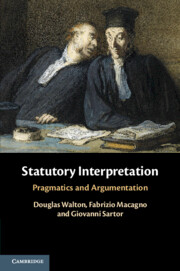Book contents
- Statutory Interpretation
- Statutory Interpretation
- Copyright page
- Dedication
- Contents
- Figures
- Tables
- Acknowledgments
- Introduction
- 1 Interpretation and Statutory Interpretation
- 2 Statutory Interpretation as Problem Solving
- 3 Interpretation and Pragmatics – Legal Ambiguity
- 4 Pragmatic Maxims and Presumptions in Legal Interpretation
- 5 Arguments of Statutory Interpretation and Argumentation Schemes
- 6 Classification and Formalization of Interpretative Schemes
- References
2 - Statutory Interpretation as Problem Solving
Published online by Cambridge University Press: 29 December 2020
- Statutory Interpretation
- Statutory Interpretation
- Copyright page
- Dedication
- Contents
- Figures
- Tables
- Acknowledgments
- Introduction
- 1 Interpretation and Statutory Interpretation
- 2 Statutory Interpretation as Problem Solving
- 3 Interpretation and Pragmatics – Legal Ambiguity
- 4 Pragmatic Maxims and Presumptions in Legal Interpretation
- 5 Arguments of Statutory Interpretation and Argumentation Schemes
- 6 Classification and Formalization of Interpretative Schemes
- References
Summary
For many readers the paradigm of argumentation in a legal setting is that of the trial, an instance of the type of dialogue called the persuasion dialogue or critical discussion in the argumentation literature (van Eemeren and Grootendorst, 1992; Walton, 1999; Prakken, 2009). This setting is an adversarial one. For example, in a criminal case the prosecution’s role is not only to support its claim that the defendant committed the crime by bringing forward evidence, but also to attack the arguments of the other side, defend its own arguments against these attacks, and prove its own claim to the standard required, that of beyond reasonable doubt in the common law system. With this paradigm in mind, it is easy to jump to the generalization that legal argumentation is a kind of persuasion dialogue in which each side is trying to persuade the trier of fact to accept its view of the matter (Feteris, 1999, 171–174; Kloosterhuis, 2013).
Information
- Type
- Chapter
- Information
- Statutory InterpretationPragmatics and Argumentation, pp. 55 - 96Publisher: Cambridge University PressPrint publication year: 2021
References
References
Cases Cited
Heydon’s Case. 1984 EWHC Exch J36.
Buckoke v. Greater London Council [1970] 2 All ER 193.
Google Spain SL and Google Inc. v. Agencia Española de Protección de Datos (AEPD) and Mario Costeja González 2014 ECLI:EU:C:2014:317.
Bodil Lindqvist v Åklagarkammaren i Jönköping 2003 ECLI:EU:C:2003:596
